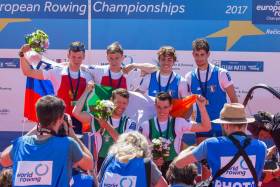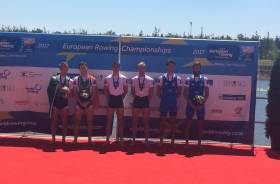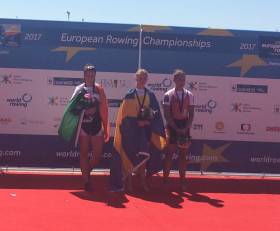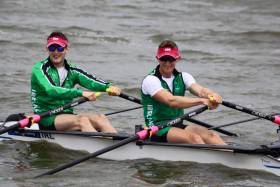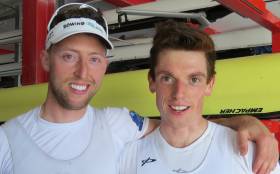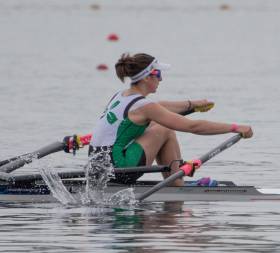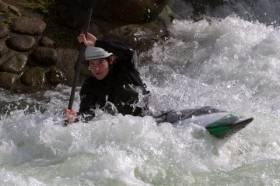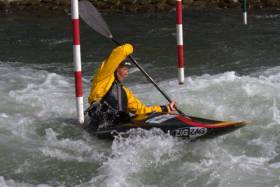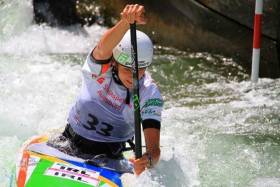Displaying items by tag: European Championships
#Rowing: The Afloat Rowers of the Month for May are Mark O’Donovan and Shane O’Driscoll. The Ireland lightweight pair took gold at both the first World Cup Regatta in Belgrade and, with a remarkable performance, the European Championships in Racice. The two Skibbereen men were disappointed to see the lightweight four, a boat in which they have campaigned, removed from the Olympic programme earlier this year. But they have left this – and international opponents – behind them since.
Rower of the Month awards: The judging panel is made up of Liam Gorman, rowing correspondent of The Irish Times, and David O'Brien, editor of Afloat magazine. Monthly awards for achievements during the year will appear on afloat.ie. Keep a monthly eye on progress and watch our 2017 champions list grow.
European Silver for Ireland's O'Donovan Brothers
#Rowing: On a wonderful day for Irish rowing, Paul and Gary O’Donovan produced a trademark burning finish to take Ireland’s third medal – silver – at the European Championships in Racice in the Czech Republic.
France showed their familiar control to take gold, while the O’Donovans moved through the field to take out Britain, Poland and then win a sprint with Italy for silver.
The day had started with a gold medal for Mark O'Donovan and Shane O'Driscoll in the lightweight pair and a silve for Denise Walsh in the women's lightweight single.
European Rowing Championships, Day Three (Selected Results; Irish interest)
Men
Lightweight Pair – A Final: 1 Ireland (M O’Donovan, S O’Driscoll) 6:32.34, 2 Russia 6:34.74, 3 Italy 6:34.89; 4 Britain (J Cassells, S Scrimgeour) 6:39.75.
Lightweight Double Sculls – A Final: 1 France 6:17.67, 2 Ireland (G O’Donovan, P O’Donovan) 6:20.06, 3 Italy 6:20.36.
Women
Lightweight Single Sculls – A Final: 1 Sweden (E Fredh) 7:36.24, 2 Ireland (D Walsh) 7:38.00, 3 Switzerland (P Merz) 7:39.94.
#Rowing: Ireland made a brilliant start to the final day of the European Rowing Championships.
Mark O’Donovan and Shane O’Driscoll dominated the men’s lightweight pair to take gold and, immediately afterwards, Denise Walsh took a gutsy silver medal in the lightweight single sculls.
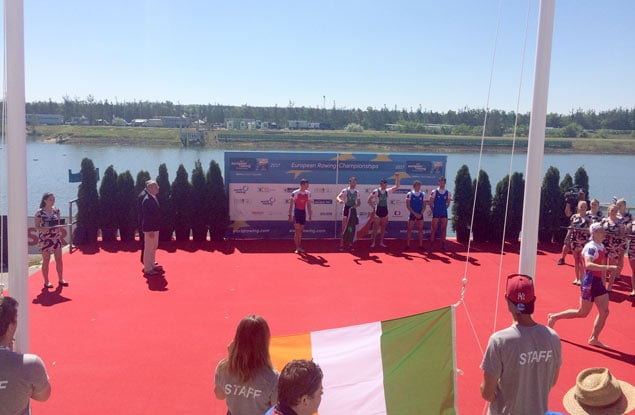 Mark O'Donovan and Shane O'Driscoll medal ceremony
Mark O'Donovan and Shane O'Driscoll medal ceremony
European Rowing Championships, Day Three (Selected Results; Irish interest)
Men
Lightweight Pair – A Final:
1 Ireland (M O’Donovan, S O’Driscoll) 6:32.34, 2 Russia 6:34.74, 3 Italy 6:34.89; 4 Britain (J Cassells, S Scrimgeour) 6:39.75.
Women
Lightweight Single Sculls – A Final: 1 Sweden (E Fred) 7:36.24, 2 Ireland (D Walsh) 7:38.00, 3 Switzerland (P Merz) 7:39.94.
Repechage Win Eases O'Donovans Into European Semi-Finals
#Rowing: Paul and Gary O’Donovan won their repechage to secure a place in the semi-finals of the lightweight double sculls at the European Rowing Championships in Racice today. The Irish crew did not start well, but by halfway they were making their move and they led through the second half of the race. As they passed the grandstand, they came under pressure from the Ukraine, but they held firm and won by a length.
European Championships, Racice, Czech Republic, Day One (Selected Results; Irish interest)
Men
Lightweight Pair – Exhibition (Race for Lanes): 1 Ireland (M O’Donovan, S O’Driscoll) 6:57.77, 2 Italy 6:59.82, 3 Russia 7:01.75, 4 Britain (J Cassells, S Scrimgeour) 7:03.39.
Lightweight Double Sculls – Heats (Winner to A/B Semi-Finals; rest to Repechages) – Heat One: 1 France (P Houin, J Azou) 6:26.97. Heat Two: Germany (L Schaefer, J Osborne) 6:37.53.
Heat Three: 1 Poland 6:25.93, 2 Ireland (G O’Donovan, P O’Donovan) 6:32.15, 3 Russia 6:36.38, 4 Switzerland 6:40.60, 5 Austria. Heat Four: 1 Italy 6:30.77.
Repechage Three (First two to A/B Semi-Finals): 1 Ireland 6:34.33, 2 Ukraine 6:36.51; 3 Portugal 6:40.75, 4 Sweden 7:05.89.
Women
Lightweight Single Sculls – Heat One (First Three to Semi-Finals; rest to Repechage): 1 Ireland (D Walsh) 7:44.85, 2 Denmark (A Runge Holmegaard) 7:49.49, 3 Poland (J Dorociak) 7:49.90; 4 Czech Republic 8:05.07, 5 Portugal 8:08.19. Heat Two: 1 Switzerland 7:42.510. Heat Three: 1 Sweden 7:39.52.
O'Driscoll and O'Donovan Give Classy Display
#Rowing: Mark O’Donovan and Shane O’Driscoll took advantage of the good conditions on the beautiful course to win their exhibition race in the men’s lightweight pair at the European Rowing Championships in Racice. The race counts in the allocation of lanes in the final, and Britain, represented by Joel Cassells and Sam Scrimgeour, and Ireland shot it out the last time this happened, at the World Cup in Belgrade. However, this time Ireland were in command from halfway, tested only by Italy, who finished second.
European Championships, Racice, Czech Republic, Day One (Selected Results; Irish interest)
Men
Lightweight Pair – Exhibition (Race for Lanes): 1 Ireland (M O’Donovan, S O’Driscoll) 6:57.77, 2 Italy 6:59.82, 3 Russia 7:01.75, 4 Britain (J Cassells, S Scrimgeour) 7:03.39.
Lightweight Double Sculls – Heats (Winner to A/B Semi-Finals; rest to Repechages) – Heat One: 1 France (P Houin, J Azou) 6:26.97. Heat Two: Germany (L Schaefer, J Osborne) 6:37.53.
Heat Three: 1 Poland 6:25.93, 2 Ireland (G O’Donovan, P O’Donovan) 6:32.15, 3 Russia 6:36.38, 4 Switzerland 6:40.60, 5 Austria. Heat Four: 1 Italy 6:30.77.
Women
Lightweight Single Sculls – Heat One (First Three to Semi-Finals; rest to Repechage): 1 Ireland (D Walsh) 7:44.85, 2 Denmark (A Runge Holmegaard) 7:49.49, 3 Poland (J Dorociak) 7:49.90; 4 Czech Republic 8:05.07, 5 Portugal 8:08.19. Heat Two: 1 Switzerland 7:42.510. Heat Three: 1 Sweden 7:39.52.
#Rowing: The Ireland lightweight double of Paul and Gary O’Donovan finished second in their heat at the European Rowing Championships in Racice in the Czech Republic today. Only the winner of each of the four heats qualified directly for the A/B semi-finals. Russia dominated early on, but the second half of the race belonged to Poland. As Russia faded, they opened a lead of over three seconds over Ireland, and despite a charge by the men in green they never looked other than winners.
France, Germany and Italy won their heats well.
European Championships, Racice, Czech Republic, Day One (Selected Results; Irish interest)
Men
Lightweight Double Sculls – Heats (Winner to A/B Semi-Finals; rest to Repechages) – Heat One: 1 France (P Houin, J Azou) 6:26.97. Heat Two: Germany (L Schaefer, J Osborne) 6:37.53.
Heat Three: 1 Poland 6:25.93, 2 Ireland (G O’Donovan, P O’Donovan) 6:32.15, 3 Russia 6:36.38, 4 Switzerland 6:40.60, 5 Austria. Heat Four: 1 Italy 6:30.77.
Women
Lightweight Single Sculls – Heat One (First Three to Semi-Finals; rest to Repechage): 1 Ireland (D Walsh) 7:44.85, 2 Denmark (A Runge Holmegaard) 7:49.49, 3 Poland (J Dorociak) 7:49.90; 4 Czech Republic 8:05.07, 5 Portugal 8:08.19. Heat Two: 1 Switzerland 7:42.510. Heat Three: 1 Sweden 7:39.52.
Walsh Wins European Heat in Impressive Fashion
#Rowing: Denise Walsh put in an impressive performance to win her heat of the lightweight single sculls at the European Rowing Championships in Racice in the Czech Republic. The bright sunshine had abated, but the Skibbereen woman took full advantage of the duller, tailwind conditions. She took a strong lead in the second half and was never truly tested from there. The small Ireland crowd cheered her over the line.
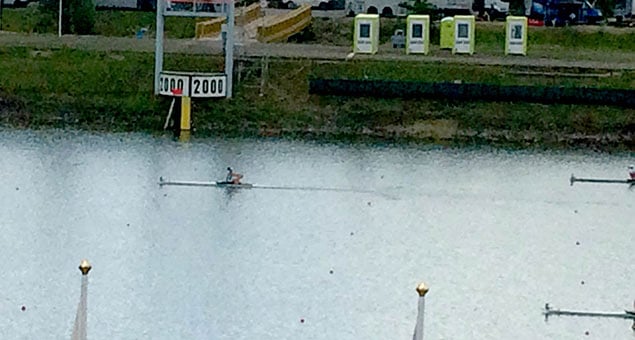 Denise Walsh crosses the line first in Racice this morning
Denise Walsh crosses the line first in Racice this morning
European Championships, Racice, Czech Republic, Day One (Selected Results; Irish interest)
Women
Lightweight Single Sculls – Heat One (First Three to Semi-Finals; rest to Repechage): 1 Ireland (D Walsh) 7:44.85, 2 Denmark 7:49.49, 3 Poland 7:49.90; 4 Czech Republic 8:05.07, 5 Portugal 8:08.19.
Jegou Gives Best But Misses Olympic Qualification
#Canoeing: Ireland’s Liam Jegou finished 19th in the semi-finals of the canoe slalom European Championships this morning. Jegou came down the course at Liptovsky Mikulas in Slovakia in 105.02 seconds. He had touches on gates one, nine and 20, thus incurring six seconds on penalties. His time of 111.02 put him fourth at that point – crucially .2 of a second behind Italy’s Raffaello Ivaldi, so ruling out the Irishman taking the top place amongst those countries who had not qualified for the Olympics.
Ander Elosegi of Spain qualified that country for the Olympic Games. He finished sixth in 104.18 – the first boat from a country not already qualified. Elosegi qualified for the final and should Jegou have also qualified, the two would have had to shoot it out on Sunday.
Canoe Slalom European Championships, Liptovsky (Irish interest, selected results) – Day Two
Men
C1 – Semi-Finals: 1 Germany (S Tasiadis) 99.79; 19 Ireland (L Jegou) 111.02 seconds (incl 6 sec pen)
No Joy for Craig at European Championships
#Canoeing: Hannah Craig’s chances of Olympic qualification disappeared as the K1 competitor failed to make the semi-finals of the canoe slalom European Championships in Slovakia. The Antrim woman, who had finished 10th in London in 2012, negotiated the course in 111.59 seconds, including four seconds of penalties, in the first run. This placed her 28th. Her second run gave her another chance, but she missed the final two gates, incurring 100 seconds in penalties, and missed out.
Liam Jegou Qualifies for European Semi-Finals
#Canoeing: Liam Jegou qualified for the semi-finals of the canoe slalom European Championships in Liptovsky Mikulas in Slovakia this morning. A second run of 98.33 seconds with no touches put the 20-year-old through in the C1 category. His first run of 105.36, with a two-second penalty on gate six, had placed him 29th and eight places outside qualification, but his second run was much better. If Jegou can do well enough in the succeeding rounds so that his boat is the first from a country not already qualified for the Olympic Games, he will secure a place in Rio de Janeiro.


























